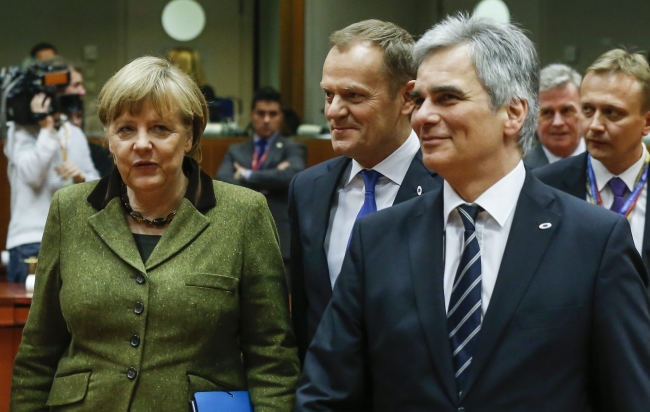
German Chancellor Angela Merkel, Polish Prime Minister Donald Tusk and Austrian Chancellor Werner Faymann attend a European Council meeting at the European Council headquarters in Brussels, Belgium, 07 February. EU heads of States gather for a two-day summit starting on 7 February with the main purpose to agree on the next Multiannual Financial Framework (MFF). EPA/THIERRY ROGE
"We feel pretty confident that we have the framework for a deal," one EU official speaking on condition of anonymity told the Reuters news agency.
"The deal is not completely finalised, but we feel sure it will be done today," the official added.
The current framework for the deal envisages a further 12 billion euros in cuts to the near trillion euro budget, after northern European countries such as the UK called for more cuts to the proposal put forward by EU president Herman Van Rompuy at the last summit on the budget in November.
This would be a three percent cut in real terms to the last seven-year budget which ended in 2012, amounting to an annual budget of 140 billion euros, the equivalent of one percent of the total EU GDP.
A British official has said off the record that the cuts would not be to regional spending – or 'cohesion policy', which Poland and other net recipients of the EU budget have been fighting to keep at current levels – but in areas such as cross-border transport, energy and telecoms projects and on pay and perks for EU officials.
Cohesion policy is set to get around 72 billion euros, an amount that Polish prime minister Donald Tusk said would be acceptable before the summit yesterday.
Roman Kuzniar, an advisor to President Bronislaw Komorowski, told Polish Radio on Friday morning, as information came out of Brussels that leaders were close to finalising a deal: “This is a good result”.
“As [the budget] is slightly less than expectations, and much lower than originally thought, the result for Poland should be considered as being very good. We should be pleased that we managed to defend [cohesion spending],” Kuzniar said.
Jacek Saryusz-Wolski, a member of the European Parliament for the centre-right Civic Platform told the TVN 24 news station that the agreement, if reached, is “only the semi-final – the final will be in the European Parliament,” he said, where “red lines have been crossed” to a budget that “reduces the ambitions of the EU”.
Saryusz-Wolski added that while the budget was “good for Poland” in that deep cuts had not been made to cohesion spending, it was “bad for the EU” as a whole.
The summit began at 19.30 CET last night, four hours later than planned as leaders met in small groups to thrash out negotiating positions.
PM Tusk had talks with both Chancellor Angela Merkel – seen as one of the main power-brokers at summits – and French president Francois Hollande, who is keen to maintain current levels of spending on the Common Agricultural Policy (CAP), which takes up around one-third of the total budget.
Poland is also a major recipient of CAP spending. (pg)